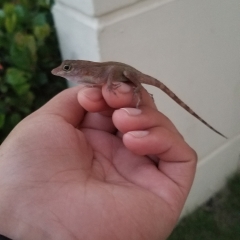Other posts here at Life in the City have covered the perils, issues, and occasional awkwardness of urban fieldwork from the perspective of the researcher, but have you considered how your naive undergraduate field technician is going to fare when thrown into the urban jungle? After going into the field now a couple of times with Kevin Aviles-Rodriguez and Kristin Winchell to catch urban anoles, I’ve got some advice for those of you heading to the field as an un-initiated undergraduate and also for researchers bringing along field crews new to urban fieldwork.
1. Be prepared for as much as you can, and you’ll pick up the rest. My very first day in the field, I was wearing jeans and a pretty top. I was driven straight from the airport into the field site (a remote forest), handed a pole, and told to start catching lizards. I thought, What have I gotten myself into? Indeed, the first few days were challenging as I adjusted to the long days of field work, but I took notes, learned quickly, and tried to improve skills like lizard catching and data collection as best as I could. Researchers – if you are bringing along undergraduates for the first time, make sure they know what to expect. Urban fieldwork may sound like flip flops and Taco Bell for lunch (okay, sometimes it is), but there are very real challenges to fieldwork in urban and forest environments that your field crew should know about ahead of time.

2. If people stare, you’re probably doing the right thing. Both projects I have been involved with had us catching our animals in broad daylight, in neighborhoods, parks, and in front of peoples’ yards. There is nothing like reaching into someone’s yard with a 10-foot-long pole, and then having to explain to them that you are not in fact trying to steal from their house, but rather, you want to catch a lizard that is hanging out in their planter. In the end, of course, the data was worth it. Data that I helped collect is going to be important in studying how cities impact morphological changes, and perhaps eventually evolution, in the long run. Still, it is important to be aware of your surroundings, not trespass onto private property without permission, and talk to people! There is no need to arouse suspicion by quickly walking away without saying a word when someone gives you a questioning look. Often, this leads to really great outreach opportunities – usually people are interested once they know what you’re doing. Researchers – make sure you talk to your field team ahead of time and encourage them to say hello and preemptively explain in a few words what you are doing.
3. Open your mindset. There were so many things that I would have said “No” to before going on field trips. I would have never willingly spent time outdoors, or gone on a night hike, or voluntarily waded around in a giant puddle to find frogs. I quickly adopted the mindset of having no fear and no comfort zone. I was traveling to places I didn’t get to go to normally, having experiences I didn’t get to normally, and I didn’t want to waste any time being scared. Keep your mind and eyes wide open and you’ll be surprised at the amazing things you find in the forest and urban areas alike. Researchers – make sure you take the time to point out cool things to your field crew, and be patient if your crew gets distracted by cool plants and animals. What may seem like an everyday occurrence to you is probably something completely new to your undergraduate field team. Help them be excited – their happiness and excitement will pay off when they get back to business.
(Below: Two types of bugs – a stick insect and a tarantula I got to hold in the field – which are my greatest fears!)
4. Get ready for the experience of your lifetime (or, at least, your summer). There are so many things that I learned in the field, from marketable things, like the resume boost and the skills of data collection and management, to personal growth and an increased interest in challenging myself. So, if this list hasn’t convinced you yet, then you may need to do your learning on the job: If you find yourself faced with the option of going on a field trip, especially one in urban ecology, you should start packing your bag!
- Recap: The Finer Points of Urban Adaptation - January 29, 2021
- Video Recommendation: The City Animal Tier List! - March 10, 2020
- Urban Observation of the Week: A Catalogue of Urban Animals in Gamboa, Panama - September 4, 2019


